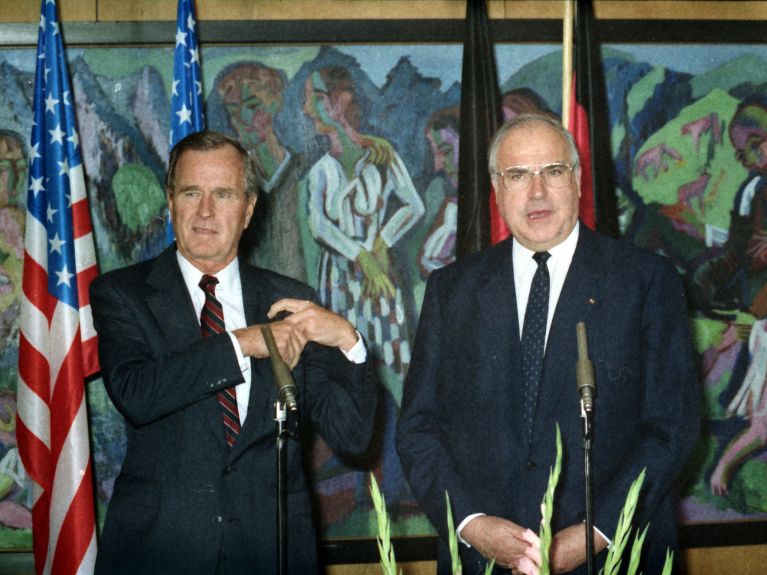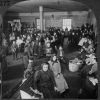History part 5: Beginning of a new era
The Wall comes down and the Cold War is history: Reunited Germany becomes a sovereign nation and a close ally of the USA.

A breakthrough in detente: The USA and the Soviet Union agreed to abolish an entire category of nuclear weapons – the cruise missiles and medium-range missiles stationed in Europe. Soviet head of state Mikhail Gorbachev, who had been in power since 1985, wanted reforms. The USSR was economically weakened and domestically under political pressure: Throughout the Soviet territories there were emerging trends towards autonomy and democratisation. It was the beginning of the end of the Cold War.
Overcoming the division
On 9 November 1989 the Peaceful Revolution by people in East Germany brought down the Berlin Wall. What had for many years seemed inconceivable suddenly seemed possible – the question of reunification of the two German states was on the agenda. It was a delicate matter for the victors in the Second World War. Although the division of Germany had long since become the most prominent symbol of the Cold War, which both sides sought to end, it would not have happened had Germany not been the aggressor in the Second World War. Above all among the British and the French there were major concerns that reunification could stoke nationalism in Germany and prompt it to again seek dominance.
Dieses YouTube-Video kann in einem neuen Tab abgespielt werden
YouTube öffnenThird party content
We use YouTube to embed content that may collect data about your activity. Please review the details and accept the service to see this content.
Open consent formThe USA supports reunification
The USA had no such fears. There, President George Bush viewed developments in Germany favourably – and supported reunification. The American objective was clear from the outset. It wanted a reunified, sovereign Germany integrated into the Western alliance. And precisely that was formulated in the Two Plus Four Treaty, which West and East Germany concluded in autumn 1990 with the four victorious Allies of the Second World War, namely the USA, Great Britain, France and the Soviet Union. United Germany received complete sovereignty under international law, and, like the Federal Republic of Germany before it, was a member of NATO. The USA sought to retain Germany as a military partner in Europe.
Alongside the then German Chancellor Helmut Kohl, US President George Bush is considered one of the “Fathers of German Unity” – he also supported Kohl in convincing Gorbachev to agree to reunification. Kohl never forgot that Bush had helped him, on several occasions stating that the latter was “a true friend of the Federal Republic of Germany” and that the Germans had much to thank him for.
In December 1991 the presidents of Russia, Ukraine and Belorussia agreed to dissolve the Soviet Union into 15 independent nations. In this way, the Cold War was considered ended.

Europe grows together anew
Germany remains the Americans’ closest ally on the Continent. After the collapse of Communism, the situation in Europe changed radically. Many of the young and independent nations in Central, East and Southeast Europe sought a point of orientation. Germany wished to contribute to Europe’s eastwards integration and received support from the USA in the process. One important step was the Maastricht Treaty, which came into force in 1993. It formed the basis for a European Monetary Union. NATO also had an interest in welcoming former Warsaw Pact member states into its fold. In March 1999, Poland, the Czech Republic and Hungary joined the military alliance.
Strong partners and allies
Since Reunification, US administrations have treated Germany as an equal partner. Both sides have intensified the transatlantic relationship and nurtured a joint culture of commemoration in which the narrative of liberation has played a strong role in how the country understands itself. “Vanquished, occupied, liberated,” was the headline the magazine “Der Spiegel” ran in its 1995 issue marking the 50th anniversary of Germany’s defeat in the Second World War.



